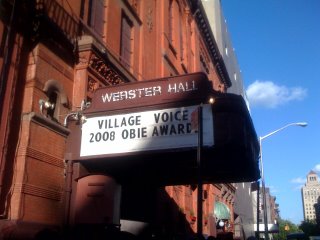
Harvey Korman of ‘Burnett Show’ Dies at 81 - Obituary (Obit) - NYTimes.com
Harvey Korman of ‘Burnett Show’ Dies at 81 - Obituary (Obit) - NYTimes.com:
Harvey Korman, the award-winning comedic actor who rose to fame playing second banana to Carol Burnett on her television variety series and who starred in hit movies like “Blazing Saddles” and “High Anxiety,” died on Thursday in Los Angeles. He was 81.
A tall man known for his outlandish characterizations, Mr. Korman was nominated for seven Emmys for his television work and won four. He also was nominated for four Golden Globe awards, winning one.
Harvey Korman, the award-winning comedic actor who rose to fame playing second banana to Carol Burnett on her television variety series and who starred in hit movies like “Blazing Saddles” and “High Anxiety,” died on Thursday in Los Angeles. He was 81.
A tall man known for his outlandish characterizations, Mr. Korman was nominated for seven Emmys for his television work and won four. He also was nominated for four Golden Globe awards, winning one.
Friday, May 30, 2008
Read
The bad news about the good news about terrorism:
Zakaria hangs his argument on a new study from Canada's Simon Fraser University that reviews the main terrorism databases. The report breaks down the data and observes that the annual double-digit increases in the death toll from terrorism that have made headlines in recent years are misleading because they include large numbers of fatalities in Iraq. "This makes no sense," Zakaria writes. "Iraq is a war zone, and as in other war zones around the world, many of those killed are civilians." We don't count deaths in other civil wars, such as those in the Democratic Republic of Congo or Sierra Leone, as terrorism fatalities, so why in Iraq? Take away the Iraqi deaths, and the databases indicate either a decline in terrorism-related deaths or a flat line. Ergo, terrorism is not the threat that the great scare machine of the U.S. government, press, and terror experts make it out to be.
For those who believe, as I do, that there has been a relentless exploitation—read, scaremongering—of the terrorist threat for political advantage and a horrifying distortion of our foreign policy into a reckless global war on terror, this is an attractive argument. Zakaria, one of our smartest foreign-policy analysts, is not the only one making it. The problem is that even if the current administration has misused the issue—and John McCain, with his relentless talk of the "transcendent challenge of our time: the threat of radical Islamic terrorism," is following in Bush's footsteps—the focus on statistics is misplaced.
Zakaria hangs his argument on a new study from Canada's Simon Fraser University that reviews the main terrorism databases. The report breaks down the data and observes that the annual double-digit increases in the death toll from terrorism that have made headlines in recent years are misleading because they include large numbers of fatalities in Iraq. "This makes no sense," Zakaria writes. "Iraq is a war zone, and as in other war zones around the world, many of those killed are civilians." We don't count deaths in other civil wars, such as those in the Democratic Republic of Congo or Sierra Leone, as terrorism fatalities, so why in Iraq? Take away the Iraqi deaths, and the databases indicate either a decline in terrorism-related deaths or a flat line. Ergo, terrorism is not the threat that the great scare machine of the U.S. government, press, and terror experts make it out to be.
For those who believe, as I do, that there has been a relentless exploitation—read, scaremongering—of the terrorist threat for political advantage and a horrifying distortion of our foreign policy into a reckless global war on terror, this is an attractive argument. Zakaria, one of our smartest foreign-policy analysts, is not the only one making it. The problem is that even if the current administration has misused the issue—and John McCain, with his relentless talk of the "transcendent challenge of our time: the threat of radical Islamic terrorism," is following in Bush's footsteps—the focus on statistics is misplaced.
Mr. Excitement News: Sunday's HTFA Panel
Mr. Excitement News: Sunday's HTFA Panel:
I caught the show when it was at Joe's Pub and I've been meaning to write about it. I went in expecting to nod my head in agreement with the critique of corporate theater, but I didn't expect to feel so vividly connected to my own memories of trying so hard to do theater, with people who believed in it just as much as I did, all across the country. So many people's dreams are tied up in this thing we call American Theater and what Mike does so brilliantly in this show is to connect his own youthful passion to that of everyone who's ever wanted a life in the theater. The critique is there -- and it is direct and it is no-kidding -- but Mike's no hater. He connects the audience emotionally to why we're all so devoted to this art form, then asks everyone to come together and address some of these hard questions.
I caught the show when it was at Joe's Pub and I've been meaning to write about it. I went in expecting to nod my head in agreement with the critique of corporate theater, but I didn't expect to feel so vividly connected to my own memories of trying so hard to do theater, with people who believed in it just as much as I did, all across the country. So many people's dreams are tied up in this thing we call American Theater and what Mike does so brilliantly in this show is to connect his own youthful passion to that of everyone who's ever wanted a life in the theater. The critique is there -- and it is direct and it is no-kidding -- but Mike's no hater. He connects the audience emotionally to why we're all so devoted to this art form, then asks everyone to come together and address some of these hard questions.
How Theater Failed America
How Theater Failed America:
Interweaving personal experience with cultural commentary, Daisey creates an alternately exhilarating and frightening picture of the contemporary American stage. From his own history as an actor and teacher, he relates how theatre can be thrilling even though it rarely pays and is so often performed under low-budget or no-budget conditions. This point is illustrated with a hilarious segment about a season of low-rent summer stock in which Daisey was part of a cast of six that performed all the roles and served as the entire crew: Even though he and his friends were sleeping on tabletops in a resort kitchen, they were still making theatre. In a particularly moving portion, Daisey explains how his love of the stage literally saved his life when a job coaching high school drama pulled him out of a depression.
Interweaving personal experience with cultural commentary, Daisey creates an alternately exhilarating and frightening picture of the contemporary American stage. From his own history as an actor and teacher, he relates how theatre can be thrilling even though it rarely pays and is so often performed under low-budget or no-budget conditions. This point is illustrated with a hilarious segment about a season of low-rent summer stock in which Daisey was part of a cast of six that performed all the roles and served as the entire crew: Even though he and his friends were sleeping on tabletops in a resort kitchen, they were still making theatre. In a particularly moving portion, Daisey explains how his love of the stage literally saved his life when a job coaching high school drama pulled him out of a depression.
Theater News - Theater - Theater News - The Stranger, Seattle's Only Newspaper
The Disappearing Critic:
Joe Adcock, theater critic at the Seattle Post-Intelligencer for 26 years, is retiring this week. Critics aren't anybody's favorite people. Last weekend, standing outside a theater during intermission, I mentioned Adcock's departure to a prominent artistic director. He replied in song: "Ding-dong, the witch is dead!" Then I told him the P-I hadn't just lost Adcock. They'd also eliminated his job, and won't hire another full-time theater critic, due to a hiring freeze. The artistic director's face fell: "Oh. That's terrible."
Joe Adcock, theater critic at the Seattle Post-Intelligencer for 26 years, is retiring this week. Critics aren't anybody's favorite people. Last weekend, standing outside a theater during intermission, I mentioned Adcock's departure to a prominent artistic director. He replied in song: "Ding-dong, the witch is dead!" Then I told him the P-I hadn't just lost Adcock. They'd also eliminated his job, and won't hire another full-time theater critic, due to a hiring freeze. The artistic director's face fell: "Oh. That's terrible."
Carrie: The Current Cinema: The New Yorker
Carrie: The Current Cinema: The New Yorker:
At least, you could argue, Miranda has a job, as a lawyer. But the film pays it zero attention, and the other women expect her to drop it and fly to Mexico without demur. (And she does.) Worse still is the sneering cut as the scene shifts from Carrie, carefree and childless in the New York Public Library, to the face of Miranda’s young son, smeared with spaghetti sauce. In short, to anyone facing the quandaries of being a working mother, the movie sends a vicious memo: Don’t be a mother. And don’t work. Is this really where we have ended up—with this superannuated fantasy posing as a slice of modern life? On TV, “Sex and the City” was never as insulting as “Desperate Housewives,” which strikes me as catastrophically retrograde, but, almost sixty years after “All About Eve,” which also featured four major female roles, there is a deep sadness in the sight of Carrie and friends defining themselves not as Bette Davis, Anne Baxter, Celeste Holm, and Thelma Ritter did—by their talents, their hats, and the swordplay of their wits—but purely by their ability to snare and keep a man. Believe me, ladies, we’re not worth it. It’s true that Samantha finally disposes of one paramour, but only with a view to landing another, and her parting shot is a beauty: “I love you, but I love me more.” I have a terrible feeling that “Sex and the City” expects us not to disapprove of that line, or even to laugh at it, but to exclaim in unison, “You go, girl.” I walked into the theatre hoping for a nice evening and came out as a hard-line Marxist, my head a whirl of closets, delusions, and blunt-clawed cattiness. All the film lacks is a subtitle: “The Lying, the Bitch, and the Wardrobe.”
At least, you could argue, Miranda has a job, as a lawyer. But the film pays it zero attention, and the other women expect her to drop it and fly to Mexico without demur. (And she does.) Worse still is the sneering cut as the scene shifts from Carrie, carefree and childless in the New York Public Library, to the face of Miranda’s young son, smeared with spaghetti sauce. In short, to anyone facing the quandaries of being a working mother, the movie sends a vicious memo: Don’t be a mother. And don’t work. Is this really where we have ended up—with this superannuated fantasy posing as a slice of modern life? On TV, “Sex and the City” was never as insulting as “Desperate Housewives,” which strikes me as catastrophically retrograde, but, almost sixty years after “All About Eve,” which also featured four major female roles, there is a deep sadness in the sight of Carrie and friends defining themselves not as Bette Davis, Anne Baxter, Celeste Holm, and Thelma Ritter did—by their talents, their hats, and the swordplay of their wits—but purely by their ability to snare and keep a man. Believe me, ladies, we’re not worth it. It’s true that Samantha finally disposes of one paramour, but only with a view to landing another, and her parting shot is a beauty: “I love you, but I love me more.” I have a terrible feeling that “Sex and the City” expects us not to disapprove of that line, or even to laugh at it, but to exclaim in unison, “You go, girl.” I walked into the theatre hoping for a nice evening and came out as a hard-line Marxist, my head a whirl of closets, delusions, and blunt-clawed cattiness. All the film lacks is a subtitle: “The Lying, the Bitch, and the Wardrobe.”
Thursday, May 29, 2008
Wal-Mart puts the squeeze on food costs - May. 29, 2008
Wal-Mart puts the squeeze on food costs - May. 29, 2008:
Ever wonder why that cereal box is only two-thirds full? Foodmakers love big boxes because they serve as billboards on store shelves. Wal-Mart has been working to change that by promising suppliers that their shelf space won't shrink even if their boxes do. As a result, some of its vendors have reengineered their packaging. General Mills' (GIS, Fortune 500) Hamburger Helper is now made with denser pasta shapes, allowing the same amount of food to fit into a 20% smaller box at the same price. The change has saved 890,000 pounds of paper fiber and eliminated 500 trucks from the road, giving General Mills a cushion to absorb some of the rising costs.
Ever wonder why that cereal box is only two-thirds full? Foodmakers love big boxes because they serve as billboards on store shelves. Wal-Mart has been working to change that by promising suppliers that their shelf space won't shrink even if their boxes do. As a result, some of its vendors have reengineered their packaging. General Mills' (GIS, Fortune 500) Hamburger Helper is now made with denser pasta shapes, allowing the same amount of food to fit into a 20% smaller box at the same price. The change has saved 890,000 pounds of paper fiber and eliminated 500 trucks from the road, giving General Mills a cushion to absorb some of the rising costs.
McClellan: Plame leak case was turning point - TODAY: People - TODAYshow.com
McClellan: Plame leak case was turning point - TODAY: People - TODAYshow.com:
“The larger message has been sort of lost in the mix ... The White House would prefer I not speak out openly and honestly about my experiences, but I believe there is a larger purpose,” Scott McClellan, the chief spokesman for the White House from 2003-2006, told TODAY co-host Meredith Vieira exclusively during his first interview since snippets from his new memoir hit the Internet on Tuesday.
“I had all this great hope that we were going to come to Washington and change it ... Then we got to Washington, and I think we got caught up in playing the Washington game the way it is being played today,” said McClellan, who made only passing references to Bush himself.
“The larger message has been sort of lost in the mix ... The White House would prefer I not speak out openly and honestly about my experiences, but I believe there is a larger purpose,” Scott McClellan, the chief spokesman for the White House from 2003-2006, told TODAY co-host Meredith Vieira exclusively during his first interview since snippets from his new memoir hit the Internet on Tuesday.
“I had all this great hope that we were going to come to Washington and change it ... Then we got to Washington, and I think we got caught up in playing the Washington game the way it is being played today,” said McClellan, who made only passing references to Bush himself.
village voice > theater > Two New Productions Rant and Roll by Alexis Soloski
village voice > theater > Two New Productions Rant and Roll by Alexis Soloski:
From the first moment of the show, sweat moistens Daisey's face. He dabs and mops at himself with a black handkerchief as he works himself into frequent lathers. Daisey favors an extreme emotionalism—laughing, shrieking, roaring throughout. Happily, he's such an engaging performer and such a fine writer that he pulls it off. (Even if you don't always agree with his arguments, you admire the sentences that form them.) Though theater may have failed, Daisey nicely succeeds.
From the first moment of the show, sweat moistens Daisey's face. He dabs and mops at himself with a black handkerchief as he works himself into frequent lathers. Daisey favors an extreme emotionalism—laughing, shrieking, roaring throughout. Happily, he's such an engaging performer and such a fine writer that he pulls it off. (Even if you don't always agree with his arguments, you admire the sentences that form them.) Though theater may have failed, Daisey nicely succeeds.
SHOWBIZ & PLEASURE MIX NICELY - New York Post
SHOWBIZ & PLEASURE MIX NICELY - New York Post:
DESPITE its off-putting title, Mike Daisey's new solo show, "How Theater Failed America," is a rollicking, entertaining evening that's as inspiring as it is cautionary.
Daisey, who burst onto the scene with "21 Dog Years," his account of working at amazon.com, clearly knows the territory, having performed monologues at regional theaters across his country. His latest monologue - now playing a limited off-Broadway engagement after winning acclaim at Joe's Pub - is a highly personal account of his often checkered theatrical past.
DESPITE its off-putting title, Mike Daisey's new solo show, "How Theater Failed America," is a rollicking, entertaining evening that's as inspiring as it is cautionary.
Daisey, who burst onto the scene with "21 Dog Years," his account of working at amazon.com, clearly knows the territory, having performed monologues at regional theaters across his country. His latest monologue - now playing a limited off-Broadway engagement after winning acclaim at Joe's Pub - is a highly personal account of his often checkered theatrical past.
Wednesday, May 28, 2008
Monday, May 26, 2008
Sunday, May 25, 2008
Wedding in Seattle
As I type this I am riding to the airport after finishing the second
weekend of HTFA at the Barrow Street. Houses have been good, and the
numbers are trending well--if this is how we do on Memorial Day
weekend, I have a lot of hope for the rest of the run.
weekend of HTFA at the Barrow Street. Houses have been good, and the
numbers are trending well--if this is how we do on Memorial Day
weekend, I have a lot of hope for the rest of the run.
I'm flying to Seattle, where I'm officiating my first wedding later
today--it's for my good friends Suzanne and Kurt, and I really
couldn't be more honored to be marrying them. I would say more on
this, but I'm saving my thoughts for the wedding.
After today, I spend Monday through Thursday in Seattle--if you're
reading this and you're a friend who'd like to get together while I'm
in town, call me and we'll see what we can make happen.
Happy wedding day,
md
Slashdot | Senate Committee Votes To Fingerprint Lenders
Slashdot | Senate Committee Votes To Fingerprint Lenders:
tjstork recommends a blog post up at Openmarket.org on the passage by a Senate committee of a fingerprinting provision in a foreclosure assistance bill. The provision would require thousands of people connected with the mortgage industry, even tangentially — possibly including part-time and seasonal real estate agents — to send fingerprints to the feds for storage in a database. No explanation is in evidence as to how this would help the problem of loan fraud. The measure passed the Senate Banking Committee by a bipartisan majority of 19 to 2.
tjstork recommends a blog post up at Openmarket.org on the passage by a Senate committee of a fingerprinting provision in a foreclosure assistance bill. The provision would require thousands of people connected with the mortgage industry, even tangentially — possibly including part-time and seasonal real estate agents — to send fingerprints to the feds for storage in a database. No explanation is in evidence as to how this would help the problem of loan fraud. The measure passed the Senate Banking Committee by a bipartisan majority of 19 to 2.
Saturday, May 24, 2008
Read
Day 3 of the R. Kelly trial: Sparkle's revenge:
Kelly's lawyers tried, exhaustively but futilely, to prevent the jury from seeing the video. This is understandable—when you're defending an accused child pornographer, it's best not to have the jury hear a man who looks just like your client refer to himself, on tape, as "daddy" as he begins to have intercourse with the alleged victim. (The girl's answer when he asks her to initiate sex: "Yes, Daddy.") There's also the matter of his prolonged urination on the girl's face and breasts, which stops and starts, and stops and starts, for what seems like minutes on end. It's excruciating to watch.
Before the tape started rolling, I thought that a few people might have to leave the courtroom. The vibe in the room, though, is more uncomfortable than appalled, like we've all been dragooned into watching Porky's Revenge at grandma's house. Aside from one guy who occasionally breaks into a nervous smile, the jury is stone-faced and intent on the big screen. The two obvious Kelly fans in the room—a pair of young girls who've scored visitors' passes—watch with their hands in their pockets and slightly downturned mouths. Kelly, wearing a dark pinstripe suit and a blue tie with diagonal orange stripes, his hair immaculately braided, tilts his head every so often, putting his chin on his hand to peer at the video from a different angle.
If the defense is to be believed, Kelly is looking at someone other than himself. In the defense's opening statement, Sam Adam Jr. proclaims, "Robert Kelly is not on that tape." I predict that in the decades to come, law schools will teach this as the "Shaggy defense." You allege that I was caught on camera, butt naked, banging on the log cabin floor? It wasn't me.
Kelly's lawyers tried, exhaustively but futilely, to prevent the jury from seeing the video. This is understandable—when you're defending an accused child pornographer, it's best not to have the jury hear a man who looks just like your client refer to himself, on tape, as "daddy" as he begins to have intercourse with the alleged victim. (The girl's answer when he asks her to initiate sex: "Yes, Daddy.") There's also the matter of his prolonged urination on the girl's face and breasts, which stops and starts, and stops and starts, for what seems like minutes on end. It's excruciating to watch.
Before the tape started rolling, I thought that a few people might have to leave the courtroom. The vibe in the room, though, is more uncomfortable than appalled, like we've all been dragooned into watching Porky's Revenge at grandma's house. Aside from one guy who occasionally breaks into a nervous smile, the jury is stone-faced and intent on the big screen. The two obvious Kelly fans in the room—a pair of young girls who've scored visitors' passes—watch with their hands in their pockets and slightly downturned mouths. Kelly, wearing a dark pinstripe suit and a blue tie with diagonal orange stripes, his hair immaculately braided, tilts his head every so often, putting his chin on his hand to peer at the video from a different angle.
If the defense is to be believed, Kelly is looking at someone other than himself. In the defense's opening statement, Sam Adam Jr. proclaims, "Robert Kelly is not on that tape." I predict that in the decades to come, law schools will teach this as the "Shaggy defense." You allege that I was caught on camera, butt naked, banging on the log cabin floor? It wasn't me.
Friday, May 23, 2008
Mission impossible | Theatre story | guardian.co.uk Arts
Mission impossible | Theatre story | guardian.co.uk Arts:
It's the kind of work, in other words, that needs thoughtful handling - and that's what Cheek By Jowl excels at. Founded in 1981, the company sprang into being during one of British theatre's periodic bouts of obesity - a time when Lloyd Webber showstoppers were all the rage and massive, concept-obsessed productions dominated the subsidised sector. Donnellan and Ormerod, aspiring young director and designer respectively (and partners in real life), wanted to turn things around. Their company would be small, supple, and cheap to run. It would travel incessantly. And it would offer an eclectic repertoire, small-scale, boutique versions of core English plays alongside big European scripts - Sophocles through to Corneille and Racine. Somehow, it all worked: with Ormerod's clean, lean designs and Donnellan's irreverent yet subtle direction, they developed a reputation for teasing the intricacies from classic texts while skewering the pieties that surround them.
It's the kind of work, in other words, that needs thoughtful handling - and that's what Cheek By Jowl excels at. Founded in 1981, the company sprang into being during one of British theatre's periodic bouts of obesity - a time when Lloyd Webber showstoppers were all the rage and massive, concept-obsessed productions dominated the subsidised sector. Donnellan and Ormerod, aspiring young director and designer respectively (and partners in real life), wanted to turn things around. Their company would be small, supple, and cheap to run. It would travel incessantly. And it would offer an eclectic repertoire, small-scale, boutique versions of core English plays alongside big European scripts - Sophocles through to Corneille and Racine. Somehow, it all worked: with Ormerod's clean, lean designs and Donnellan's irreverent yet subtle direction, they developed a reputation for teasing the intricacies from classic texts while skewering the pieties that surround them.
Thursday, May 22, 2008
Book Club of the Damned: I Will Fear No Evil, Part 2 | Slog | The Stranger | Seattle's Only Newspaper
Book Club of the Damned: I Will Fear No Evil, Part 2 | Slog | The Stranger | Seattle's Only Newspaper:
So far, the inordinately wealthy male businessman Johann Sebastian Bach Smith has had his brain implanted into the nubile young female body of his secretary, Eunice. Somehow, Eunice’s thoughts have survived the loss of her brain, and so the two are communicating mentally via dueling parentheses, like so:
(Eunice, would you still be willing to have a baby by me?) (What? Boss, don’t joke about it. Don’t mock me.) (I’m not joking, beloved.)
Eunice has started referring to Johann, who now answers to Joan Eunice, as “Twin.” In the last hundred and sixty pages, they have made out with a lot of men. That’s just about all that they have done.
So far, the inordinately wealthy male businessman Johann Sebastian Bach Smith has had his brain implanted into the nubile young female body of his secretary, Eunice. Somehow, Eunice’s thoughts have survived the loss of her brain, and so the two are communicating mentally via dueling parentheses, like so:
(Eunice, would you still be willing to have a baby by me?) (What? Boss, don’t joke about it. Don’t mock me.) (I’m not joking, beloved.)
Eunice has started referring to Johann, who now answers to Joan Eunice, as “Twin.” In the last hundred and sixty pages, they have made out with a lot of men. That’s just about all that they have done.
FakeTV emulates human watching the tube, supposedly discourages thieves - Engadget
FakeTV emulates human watching the tube, supposedly discourages thieves - Engadget:
What else can we say? The concept here is pure genius, and it totally makes those pricey security systems seem way pointless (okay, slightly less critical). The FakeTV is a strobe that sets up in an occupied room at night and flashes up beams of light. From the inside, we can imagine it looks fairly curious, but from the outside, it gives prospective burglars the idea that someone is actually awake and watching a television program. It promises to produce the effects of "scene changes, fades, swells, flicks, on-screen motion and color changes," just like they were generated by a bona fide set.
What else can we say? The concept here is pure genius, and it totally makes those pricey security systems seem way pointless (okay, slightly less critical). The FakeTV is a strobe that sets up in an occupied room at night and flashes up beams of light. From the inside, we can imagine it looks fairly curious, but from the outside, it gives prospective burglars the idea that someone is actually awake and watching a television program. It promises to produce the effects of "scene changes, fades, swells, flicks, on-screen motion and color changes," just like they were generated by a bona fide set.
Save Union Square: What's Going On? What Can You Do?
Save Union Square: What's Going On? What Can You Do?:
Here's the skinny: after letting the pavilion building fall into disrepair for over a decade, the city government was finally ready to pony up the cash to repair the building and return it to public use. Before the city could even complete their own plans, the Union Square Business Improvement District, or BID, (led by corporate chain stores such as Barnes and Noble and Whole Foods) got involved, dangling wads of extra (anonymously donated) cash, and before you know it the plans that emerged took on a decidedly unfriendly tone, particularly if you happen to be an artist selling your work, a farmer selling food, or any citizen who might want to just sit down in the park without having to purchase a $5.00 latté.
The BID plan will create two more lanes of traffic on 17th street, thereby reducing the space for the Farmer's Market by half, forcing them to push into space previously occupied by artists (this is the divide and conquer strategy, as old as Machiavelli). Furthermore, the Pavilion, an icon of free speech and free assembly, is slated to be turned into a swanky restaurant, about the last thing this particular neighborhood needs. In combination, these two developments will pretty much eliminate Union Square North as a viable place for public assembly. Without public space to peaceably assemble, the First Amendment is meaningless. How did this happen?
Mayor Mike's buddy, Danny Meyer, the owner of the Shake Shack at Madison Square Park, as well as Gramercy Tavern and Union Square Cafe, is the head of the Union Square Partnership. He is a primary backer of this plan. Meyer and his backers found willing partners in the offices of the corporate chains that surround the park. And why not? Fewer farmers means more business for Whole Foods. Fewer artist-vendors means more knick-knack sales for Barnes and Noble. We suspect that the "anonymous" donation that greased the wheels of this back room deal came from Danny Meyer, or from one of his backers. We also suspect that the future swanky restaurant in the Pavilion might just be run by Mr. Meyer himself. But of course this is all speculation, because THERE IS NO TRANSPARENCY IN THE PROCESS. We don't know how such a crap plan got put together, with no meaningful community input. We just know that they were able to get it passed, and that they even got Rosie Mendez to sign off on it. They bought off her and some of the opposition by promising to expand the children's playground, a classic bait and switch tactic to obscure the reality of this plan: they are decreasing the size of the park, giving it over to cars and to private businesses.
Here's the skinny: after letting the pavilion building fall into disrepair for over a decade, the city government was finally ready to pony up the cash to repair the building and return it to public use. Before the city could even complete their own plans, the Union Square Business Improvement District, or BID, (led by corporate chain stores such as Barnes and Noble and Whole Foods) got involved, dangling wads of extra (anonymously donated) cash, and before you know it the plans that emerged took on a decidedly unfriendly tone, particularly if you happen to be an artist selling your work, a farmer selling food, or any citizen who might want to just sit down in the park without having to purchase a $5.00 latté.
The BID plan will create two more lanes of traffic on 17th street, thereby reducing the space for the Farmer's Market by half, forcing them to push into space previously occupied by artists (this is the divide and conquer strategy, as old as Machiavelli). Furthermore, the Pavilion, an icon of free speech and free assembly, is slated to be turned into a swanky restaurant, about the last thing this particular neighborhood needs. In combination, these two developments will pretty much eliminate Union Square North as a viable place for public assembly. Without public space to peaceably assemble, the First Amendment is meaningless. How did this happen?
Mayor Mike's buddy, Danny Meyer, the owner of the Shake Shack at Madison Square Park, as well as Gramercy Tavern and Union Square Cafe, is the head of the Union Square Partnership. He is a primary backer of this plan. Meyer and his backers found willing partners in the offices of the corporate chains that surround the park. And why not? Fewer farmers means more business for Whole Foods. Fewer artist-vendors means more knick-knack sales for Barnes and Noble. We suspect that the "anonymous" donation that greased the wheels of this back room deal came from Danny Meyer, or from one of his backers. We also suspect that the future swanky restaurant in the Pavilion might just be run by Mr. Meyer himself. But of course this is all speculation, because THERE IS NO TRANSPARENCY IN THE PROCESS. We don't know how such a crap plan got put together, with no meaningful community input. We just know that they were able to get it passed, and that they even got Rosie Mendez to sign off on it. They bought off her and some of the opposition by promising to expand the children's playground, a classic bait and switch tactic to obscure the reality of this plan: they are decreasing the size of the park, giving it over to cars and to private businesses.
Tuesday, May 20, 2008
A Chronicler of Late-Night Party Melancholy - City Room - Metro - New York Times Blog
A Chronicler of Late-Night Party Melancholy - City Room - Metro - New York Times Blog:
“I like that hour between 3 and 4 in the morning when desperation sets in, when you see all the anticipation of going out starting to fade. The masks drop and everybody realizes the night is not going to be everything they were hoping for.”
“I like that hour between 3 and 4 in the morning when desperation sets in, when you see all the anticipation of going out starting to fade. The masks drop and everybody realizes the night is not going to be everything they were hoping for.”
The world's a stage at MCA :: CHICAGO SUN-TIMES :: Hedy Weiss
The world's a stage at MCA :: CHICAGO SUN-TIMES :: Hedy Weiss:
Performing artists with roots in Nigeria, Japan and Quebec, as well as from throughout the United States, will be part of the 2008-09 Performance season at the Museum of Contemporary Art, 220 E. Chicago. Among the many intriguing offerings will be a new take on Stravinsky's "The Rite of Spring" inspired by life in the high-energy Nigerian capital of Lagos; a seven-hour presentation of the full text of F. Scott Fitzgerald's classic novel The Great Gatsby; the tale of a Japanese couple holed up in a "love hotel" far from global news events, and a new dance version of the Orpheus and Eurydice myth.
Here is the complete rundown of the MCA's to date, with more entries to be added in the future:
-- "If You See Something Say Something" (Oct. 10-12), author-humorist Mike Daisey's satirical monologue that takes aim at the Department of Homeland Security and also relates the story of the inventor of the neutron bomb.
Performing artists with roots in Nigeria, Japan and Quebec, as well as from throughout the United States, will be part of the 2008-09 Performance season at the Museum of Contemporary Art, 220 E. Chicago. Among the many intriguing offerings will be a new take on Stravinsky's "The Rite of Spring" inspired by life in the high-energy Nigerian capital of Lagos; a seven-hour presentation of the full text of F. Scott Fitzgerald's classic novel The Great Gatsby; the tale of a Japanese couple holed up in a "love hotel" far from global news events, and a new dance version of the Orpheus and Eurydice myth.
Here is the complete rundown of the MCA's to date, with more entries to be added in the future:
-- "If You See Something Say Something" (Oct. 10-12), author-humorist Mike Daisey's satirical monologue that takes aim at the Department of Homeland Security and also relates the story of the inventor of the neutron bomb.
A huge congratulations to Heidi Schreck, who won an Obie tonight—we've been friends and colleagues for more than a decade, and there's no one I'd rather see win one tonight, myself included.
She's always been a magnificent artist, a brilliant actor, a gifted playwright, and an excellent human being.

(Collage built on the cheap via Google Image search and a little screenshotting...after the Obies, this is as high-tech as I get.)
She's always been a magnificent artist, a brilliant actor, a gifted playwright, and an excellent human being.

(Collage built on the cheap via Google Image search and a little screenshotting...after the Obies, this is as high-tech as I get.)
Leaving Your Artistic Legacy
by Craig Lucas
The following is a commencement address I delivered on Sunday to the graduates of the Boston University College of Fine Arts
Congratulations! Congratulations congratulations congratu-lations congratulations. I'm honored to stand here and say, Congratulations! You have proved once and for all that you are indeed incredibly hard-working and genuinely talented. You can now go tell your High School Guidance Counselor what to do with that joyless advice they probably offered.
I only sort of remember my graduation. I know I was not really looking forward to facing "real" life, but I was so happy to be done with school
School is incredibly hard. Change is hard. Being constantly told what you don't know is horrible. Exploring the unknown, stuffing the brain with new information while emptying it of what is now revealed to be erroneous is all completely horrible. Falling on your face. It makes us feel stupid and encourages more confident students to leap up and show off. One wishes bad things to rain down on them. You know, the ones who got cast in everything, got all the solos, the praise, whose poems are already appearing in the goddamn New Yorker and who handled it all with such grace, one wishes for them to fall down and chip their teeth.
Perhaps it's because: how in the hell are we to face a life in the arts? Did they teach us that? I don't remember that happening, but I cut a lot of classes and I am a very slow learner and late bloomer. Really. So when your parents start asking what the hell is going on, what are you working on?, remind them that Van Gogh didn't paint until he was 27; don't mention Schiele whose huge body of unforgettable work was cut short by his death at 18. Don't mention him. Or Jesus.
What I vaguely remember about my graduation is having to sit and listen to some ancient man, older than carbon, standing before us in red gown droning on and on about the meaning of a life in the arts in America.
Now I'm back and this time I'm up here and, worse still, I know what you're thinking.
You want to drink and get laid, and I want that for you, I really do. (Or was that high school?)
It bears noting that some years after graduating, I started to read about the Group Theatre, the seminal theater company which saw its own function in society as being something more than the attainment of success, fame and wealth. Elia Kazan, Lee Strasburg, Clifford Odets and Harold Clurman, the director of Member of the Wedding and author of the finest book on directing we have, and our greatest drama critic.
That was the ancient man who spoke to us.
Never mind. Here's the good news:
"Real" life is no more unfair, cliqueish, competitive, back-biting, frustrating and claustrophobic than college. In my experience. The trouble with experience, of course, is you have to have it yourself, you never take it on faith.
So since I can't spare you the pain and humiliation soon to be brought about by your absolute unwillingness to trust me, I can tell you that through all the pain and suffering will also to be the consolations of sex, art and pursuit of justice. An added perk to these three -- if you fully commit yourself to sex, art and justice - the Republicans will be out on their ass.
Why should that be? Because -- and here's more good news -- sex and pleasure will always be radical ideas. It is eternally the reactionary who wants to control our behavior in the bedroom, our delight in being alive and rewarding ourselves on this side of the grave; they are the ones who wish to punish people for having sex for pleasure by forcing them to have babies they don't want and then giving them no health care, no day care, no maternity leave, nothing! God is on their side, pointing to something originally written in Aramaic by people who refused to eat lobster and stoned you if you did. Bush says he talks to god. As do people wandering about the subway.
I'm not saying religion is wrong. Not at all. Jesus said give your money away. Love your enemy. Charity is the greatest virtue. Let he who is without sin cast the first stone. He did say, If a member offends you, cut it off. And I'm not down with that at all.
So that's sex.
Justice. I'm leaving art for last -- Why should I be any different than Congress?
Complete and eternal justice is unattainable. Things are defined by their opposite.
However, the Big Shots who told my generation that people of different "races" should not marry or sleep together; that sodomy was a good reason to discriminate against people and oust them from their jobs and prevent them from marrying and having children; that Christianity is our one true national religion; that killing a million poor people in a country that never threatened us is "Bringing Them Democracy" -- these barefaced lying hypocrites are finally headed straight where they belong inside the dioramas at the Museum of Natural History. [Right next to the Saber-Toothed Tiger. Reeow!]
As I see it, you are the first generation in a long time to register to vote and oppose reactionary politics, and this could mean the arts finally receive some of the attention and federal support the Dinosaurs stole from us twenty-years ago. You guys have the power to remind everyone, as preceding generations failed to do, that Art is a quality of life issue! It makes things better. Worth living.
And you don't have to agree with all of it -- whatever that means, who the hell "agrees" with the Mona Lisa? -- in order to support it. I don't have to agree with the bombs my taxes pay for, it's part of democracy to pony up anyway.
It's way too easy to dismiss people we don't agree with, which I have been doing since I stood up. Certainly we don't have to like everybody-only Buddha and Laura Bush can do that -but as artists, we pretty much have to love them. We can still hate them, but we have to find a way into their experience, and find them inside ourselves-the tyrant, the barefaced lying hypocrite, in here. Without doing that, having done that, we could never have Iago, Richard III, Oedipus, Willy Loman, Hannibal Lecter. There would be no Goya, Francis Bacon, Diane Arbus.
If you can hold two diametrically opposed ideas in your head at the same time, you can write a play. The push and pull of paint, sound, bodies in space, clay, cat gut on horse hair (do they still use that shit?) is all about one thing: Conflict. Us and Them.
Example: the American people own the airways, legally, they're yours and mine, and we let Congress give them away to TV executives who then use them, our airwaves -- I'm not making this up -- to sell us things we don't necessarily need like war and deodorant and antidepressants we choose to take so we won't get too angry or sad about what they are doing to us.
Without understanding that and them, the ones doing all the doing, our art can get puny and impotent -- just more pretty frou frous for the rich to wear on their way to dispensing with compassion altogether. No art should be less than outrageously itself! A new work of art that offends no one, neither surprises, frightens, mystifies nor startles, is not a new work at all, but a clone of the past.
Please don't get me wrong. I hope you get rave reviews. I hope you receive every award and accolade there is. And I wish you fame and I hope you get very rich. All of you, I really do. I think you can make the world so much better, I know it. Most of all what I want for you ... is hope itself. Which requires either courage or tremendous foolishness or frivolity or indifference and god knows there is nothing wrong with these, especially if they help you to create.
I do think I should bring up just a couple of things your teachers probably didn't dwell on, if only because I don't believe I was asked here to simply sprout bromides while predicting rosy outcomes, or they would have asked the White House Press Secretary.
In getting all the things you want and deserve, these are the things I have seen prove problematic:
Getting raves.
Receiving awards.
Getting rich and famous.
If you're lucky enough to be published, give a concert, dance, see your paintings hung in galleries, have a play produced, you are going to be criticized.
This criticism is not generally the kind you got here. Here, they wanted you to get better. There, very often, they want you to go away. You challenge them. Hopefully they haven't before seen what you do. What if they look foolish for liking it? They very well may envy you, even hate you. You're getting to do what they wanted very much to do and can't. Or aren't brave enough to do.
Just remember: your success is only news once. After that, the only possible news flash, is that you're not what you're cracked up to be or your new work isn't as good as the old. Eventually, if you keep at it, they will rediscover your brilliance, thereby giving themselves another chance to draw attention to their own brilliance of perception.
Some artists do escape this. They're geniuses, they came at a moment when to belittle them would reflect badly on the critic; either way, I hope it happens for you, it won't be within your power to decide, but such good fortune does come to some, and may you all beat the odds.
If you don't, you might try listening to what people criticize you for. Cocteau said it's who you are. Marlon Brando's mumbling. Philip Glass's triplets and basic harmonics. Anne Sexton's solipsism. Mamet's vulgarity. Twyla Tharps eccentric toss of limbs.
By the way, if any of you do become a critic, please remember that your first task is to give your readers an experience of what it was like to be there. You were privileged. You got to see it. If it becomes too burdensome for you to go out and see things for free that other people have to pay for, try to locate some gratitude for all the responsibility you have been accorded.
Who can tell me what play won the Pulitzer Prize Drama the year of "Who's Afraid of Virginia Woolf?" None. It was decided there were no worthy plays that year. What won the Pulitzer for Drama the year before? "How to Succeed in Business Without Really Trying."
Clearly, many great and deserving writers have received the Nobel Prize in Literature. Nonetheless, here are some who never won, all of whom died after the Prize was instituted:
Virginia Woolf
James Joyce
Marcel Proust
Auden
Nabokov
Ibsen
Mark Twain
Wallace Stevens
Tolstoy!
Brecht
Chekhov!
Bulkagov
Genet
Strindberg!
Lorca
Kafka
Conrad
D.H. Lawrence
Orwell
Mishima
Rilke
F. Scott Fitzgerald
Ralph Ellison
Who are some of the greats who took their place?
Jaroslav Seifert
Carl Spitteler
Ivo Andric
Selma Lagerlof
Paul Heyse
Pearl S. Buck.
The Moral: only time will decide. Since you may already be dead then, make the art you want to make.
A sidenote: The only people who should be allowed to care, really care, about your awards and raves, besides your agent, manager, accountant and, of course, audiences, are your mom ... and potential dates. If you cling to any of what is said about you -- good or bad -- you're dead. Those are the ones you see on E! stumbling in and out of limousines, showing off their pooter.
Beware of Making it. Obviously this danger hovers more ominously over some than it does others. Poets, ballet dancers, oboists, arts administrators teachers and historians, even playwrights - our dreams of money and fame ought not extend much beyond, say, the Parent Teachers Association and, hopefully, a pretty good 401K. Pop music, movies and TV, the sky's the limit.
Art critic Clement Greenberg was instrumental in making Jackson Pollock rich (but please note, being rich did not make Pollock entirely happy, it would appear at least to have figured in making him dead.) Lichtenstein, Jasper Johns, Schnabel-critics helped make these men very rich. And good for them; if it hasn't killed them, we applaud them.
The commercial prospects, however, for a handful of inimitable geniuses and/or those lucky enough to find international critical adoration should not serve as guidelines for anyone outside the psyche ward. The commercial prospects today for artists in America is, let's say, interesting and complicated. But is it any worse than it was sixty/seventy years ago when O'Neill, , DeKooning and Martha Graham were making new work?
Here's Brecht from 1941. He's in Hollywood speaking to a fellow émigré who has become rich and famous, about his, Brecht's, new play, Galileo, one of the few unquestioned masterpieces of 20th century drama:
-and it is as if I were remembering a strange sunken theater in ancient times on a submerged continent. here [in America] all they are concerned about is selling an evening's entertainment. the buyer is the boss, hard to please, suspicious, blasé or plagued by strange wishes, always ready to shoo away sellers like bothersome flies. whole hierarchies of experts and agents have forced their way between seller" - he means artist - "and buyer" - audience - "claiming to know the needs and wishes of the buyers; in this way the sellers never get through to the buyers, who in turn never meet the sellers face to face. all they are actually introduced to are the goods, crippled, mutilated objects of suspicion and eulogy, tailored to fit a body that never put in an appearance. every act of selling thus becomes a defeat, either for the buyer or for the seller, depending on whether a sale is made or not. for an author to succeed, his public must fail. the idea that matters of concern to the nation might be treated on the stage is utterly fanciful, since nothing of the kind happens anywhere else in the entertainment business.
I don't know, I find this comforting. It was ever thus in the land of Opportunity. It either makes money or it ain't. But wait, you say! What about the symphonies, ballet companies, schools that are going to hire me?
It is now time for you to turn to your graduating colleagues in arts administration, history and teaching and beg them, on your hands and knees, to protect you. It is up to them to create audiences that will support what we do. If they don't demand that their audiences open their eyes and greet the new, demand funding, fight zoning laws, parking laws, tax schemes, real estate scams, your new ballet, concerto, play, sculpture may well find its audience in single digits in your friend's father's garage in Burlington. There is no one in this room you need more than the teacher, manager, historian, theoretician. So check to see if they're wearing a ring on this finger.
Okay, my last downer-arguably the most catastrophic threat to your art, never mind you:
Success.
Here's some Tennessee Williams -- to balance out Brecht's European butch bravado with some sweet-tongued, homegrown homo-wisdom:
Security is a kind of death, I think, and it can come to you in a storm of royalty checks beside a kidney-shaped pool in Beverly Hills or anywhere at all that is removed from the conditions that made you an artist, if that's what you are or were or intended to be." [...] "The sight of an ancient woman, gasping and wheezing as she drags a heavy pail of water down a hotel corridor to mop up the mess of some drunken overprivileged guest, is one that sickens and weighs upon the heart and withers it with shame for this world in which it is not only tolerated but regarded as proof positive that the wheels of Democracy are functioning as they should without interference from above or below. Nobody should have to clean up anybody else's mess in this world.
Did anyone see American Idol Wednesday night (okay, I watched, so what?!?!?) And, small tangent: I'd like to see just one of those melismatic tweens try their hand at Visi D'Arte. Anyway, the commercial where the final three contestants were shown in their new imaginary mansions, with chauffeurs and uniformed butlers and vast beachfront property, every last detail of their existence being taken care of by someone else? Not one mention of, say, excellence in music or making other people joyous, improving lives, being good at something. No, the point of it all: WEALTH! The most important thing is being able to hire people to wipe your ass!
You don't want it to be easy. You think you do, but you don't.
I promise. Deep down most artists I know know full well that art and artists are born in trauma. Painful, scary things kick our innate talents into gear, otherwise why would we ever put up with all the mishegas and bullshit and naysaying. We have to express these things, no matter how, no matter what: that loneliness and injustice and untrammeled sense of ourselves! I was here, goddamit! Listen up! Look!
Take away that mote in your eye, the tears dry up, and what will you sing about? How hard it is to be rich?
I absolutely refuse to believe that you and parents sacrificed so much to send you here to this incredibly expensive place, which you so desperately hoped would do justice to your talent, god please prove that I have enough of it, so you could then completely jettison the idea of sacrifice and justice when you got out?
Do we really need another prominent American to stand before the world and say that the sacrifice they made in a ghastly war was to give up golf? That's the kind of entitlement and greed that comes with too much privilege. (And what even is that? Have you ever known anyone in your entire life who was so clueless they would say something like that even if they were alone in a some desert gas station toilet stall in the middle of the Yucatan?)
By all means, earn accolades, find fame and fortune, and when the world falls at your feet, just don't let them tell you what to do next. Just don't let them make you do the same new thing over and over. The world is full of artists who literally painted themselves into a corner. No one should have to write the same play twice.
Learn that most magical of words, the one that will open the most doors, command the most respect, and free you from the tyrant within and without:
No.
If all we do as artists is make people feel, that alone can subvert some of the cynicism and indifference being peddled.
By feel, I don't mean that warm glow audiences get when they're told how smart they are and everything is fine just as it is; that warmth is nothing more than the fever accompanying the disease that is killing them. That's called pandering and people will pay an awful lot for that; and so will you. You really can ask more of yourself and your audience.
That's the hope I want for you.
We began, as artists, tens of thousands of years ago, by putting our hands to the walls of the caves and leaving a handprint: "I was here! This is what it was like! These arrows, these animals, this blood."
That is still our job.
Congratulations.
by Craig Lucas
The following is a commencement address I delivered on Sunday to the graduates of the Boston University College of Fine Arts
Congratulations! Congratulations congratulations congratu-lations congratulations. I'm honored to stand here and say, Congratulations! You have proved once and for all that you are indeed incredibly hard-working and genuinely talented. You can now go tell your High School Guidance Counselor what to do with that joyless advice they probably offered.
I only sort of remember my graduation. I know I was not really looking forward to facing "real" life, but I was so happy to be done with school
School is incredibly hard. Change is hard. Being constantly told what you don't know is horrible. Exploring the unknown, stuffing the brain with new information while emptying it of what is now revealed to be erroneous is all completely horrible. Falling on your face. It makes us feel stupid and encourages more confident students to leap up and show off. One wishes bad things to rain down on them. You know, the ones who got cast in everything, got all the solos, the praise, whose poems are already appearing in the goddamn New Yorker and who handled it all with such grace, one wishes for them to fall down and chip their teeth.
Perhaps it's because: how in the hell are we to face a life in the arts? Did they teach us that? I don't remember that happening, but I cut a lot of classes and I am a very slow learner and late bloomer. Really. So when your parents start asking what the hell is going on, what are you working on?, remind them that Van Gogh didn't paint until he was 27; don't mention Schiele whose huge body of unforgettable work was cut short by his death at 18. Don't mention him. Or Jesus.
What I vaguely remember about my graduation is having to sit and listen to some ancient man, older than carbon, standing before us in red gown droning on and on about the meaning of a life in the arts in America.
Now I'm back and this time I'm up here and, worse still, I know what you're thinking.
You want to drink and get laid, and I want that for you, I really do. (Or was that high school?)
It bears noting that some years after graduating, I started to read about the Group Theatre, the seminal theater company which saw its own function in society as being something more than the attainment of success, fame and wealth. Elia Kazan, Lee Strasburg, Clifford Odets and Harold Clurman, the director of Member of the Wedding and author of the finest book on directing we have, and our greatest drama critic.
That was the ancient man who spoke to us.
Never mind. Here's the good news:
"Real" life is no more unfair, cliqueish, competitive, back-biting, frustrating and claustrophobic than college. In my experience. The trouble with experience, of course, is you have to have it yourself, you never take it on faith.
So since I can't spare you the pain and humiliation soon to be brought about by your absolute unwillingness to trust me, I can tell you that through all the pain and suffering will also to be the consolations of sex, art and pursuit of justice. An added perk to these three -- if you fully commit yourself to sex, art and justice - the Republicans will be out on their ass.
Why should that be? Because -- and here's more good news -- sex and pleasure will always be radical ideas. It is eternally the reactionary who wants to control our behavior in the bedroom, our delight in being alive and rewarding ourselves on this side of the grave; they are the ones who wish to punish people for having sex for pleasure by forcing them to have babies they don't want and then giving them no health care, no day care, no maternity leave, nothing! God is on their side, pointing to something originally written in Aramaic by people who refused to eat lobster and stoned you if you did. Bush says he talks to god. As do people wandering about the subway.
I'm not saying religion is wrong. Not at all. Jesus said give your money away. Love your enemy. Charity is the greatest virtue. Let he who is without sin cast the first stone. He did say, If a member offends you, cut it off. And I'm not down with that at all.
So that's sex.
Justice. I'm leaving art for last -- Why should I be any different than Congress?
Complete and eternal justice is unattainable. Things are defined by their opposite.
However, the Big Shots who told my generation that people of different "races" should not marry or sleep together; that sodomy was a good reason to discriminate against people and oust them from their jobs and prevent them from marrying and having children; that Christianity is our one true national religion; that killing a million poor people in a country that never threatened us is "Bringing Them Democracy" -- these barefaced lying hypocrites are finally headed straight where they belong inside the dioramas at the Museum of Natural History. [Right next to the Saber-Toothed Tiger. Reeow!]
As I see it, you are the first generation in a long time to register to vote and oppose reactionary politics, and this could mean the arts finally receive some of the attention and federal support the Dinosaurs stole from us twenty-years ago. You guys have the power to remind everyone, as preceding generations failed to do, that Art is a quality of life issue! It makes things better. Worth living.
And you don't have to agree with all of it -- whatever that means, who the hell "agrees" with the Mona Lisa? -- in order to support it. I don't have to agree with the bombs my taxes pay for, it's part of democracy to pony up anyway.
It's way too easy to dismiss people we don't agree with, which I have been doing since I stood up. Certainly we don't have to like everybody-only Buddha and Laura Bush can do that -but as artists, we pretty much have to love them. We can still hate them, but we have to find a way into their experience, and find them inside ourselves-the tyrant, the barefaced lying hypocrite, in here. Without doing that, having done that, we could never have Iago, Richard III, Oedipus, Willy Loman, Hannibal Lecter. There would be no Goya, Francis Bacon, Diane Arbus.
If you can hold two diametrically opposed ideas in your head at the same time, you can write a play. The push and pull of paint, sound, bodies in space, clay, cat gut on horse hair (do they still use that shit?) is all about one thing: Conflict. Us and Them.
Example: the American people own the airways, legally, they're yours and mine, and we let Congress give them away to TV executives who then use them, our airwaves -- I'm not making this up -- to sell us things we don't necessarily need like war and deodorant and antidepressants we choose to take so we won't get too angry or sad about what they are doing to us.
Without understanding that and them, the ones doing all the doing, our art can get puny and impotent -- just more pretty frou frous for the rich to wear on their way to dispensing with compassion altogether. No art should be less than outrageously itself! A new work of art that offends no one, neither surprises, frightens, mystifies nor startles, is not a new work at all, but a clone of the past.
Please don't get me wrong. I hope you get rave reviews. I hope you receive every award and accolade there is. And I wish you fame and I hope you get very rich. All of you, I really do. I think you can make the world so much better, I know it. Most of all what I want for you ... is hope itself. Which requires either courage or tremendous foolishness or frivolity or indifference and god knows there is nothing wrong with these, especially if they help you to create.
I do think I should bring up just a couple of things your teachers probably didn't dwell on, if only because I don't believe I was asked here to simply sprout bromides while predicting rosy outcomes, or they would have asked the White House Press Secretary.
In getting all the things you want and deserve, these are the things I have seen prove problematic:
Getting raves.
Receiving awards.
Getting rich and famous.
If you're lucky enough to be published, give a concert, dance, see your paintings hung in galleries, have a play produced, you are going to be criticized.
This criticism is not generally the kind you got here. Here, they wanted you to get better. There, very often, they want you to go away. You challenge them. Hopefully they haven't before seen what you do. What if they look foolish for liking it? They very well may envy you, even hate you. You're getting to do what they wanted very much to do and can't. Or aren't brave enough to do.
Just remember: your success is only news once. After that, the only possible news flash, is that you're not what you're cracked up to be or your new work isn't as good as the old. Eventually, if you keep at it, they will rediscover your brilliance, thereby giving themselves another chance to draw attention to their own brilliance of perception.
Some artists do escape this. They're geniuses, they came at a moment when to belittle them would reflect badly on the critic; either way, I hope it happens for you, it won't be within your power to decide, but such good fortune does come to some, and may you all beat the odds.
If you don't, you might try listening to what people criticize you for. Cocteau said it's who you are. Marlon Brando's mumbling. Philip Glass's triplets and basic harmonics. Anne Sexton's solipsism. Mamet's vulgarity. Twyla Tharps eccentric toss of limbs.
By the way, if any of you do become a critic, please remember that your first task is to give your readers an experience of what it was like to be there. You were privileged. You got to see it. If it becomes too burdensome for you to go out and see things for free that other people have to pay for, try to locate some gratitude for all the responsibility you have been accorded.
Who can tell me what play won the Pulitzer Prize Drama the year of "Who's Afraid of Virginia Woolf?" None. It was decided there were no worthy plays that year. What won the Pulitzer for Drama the year before? "How to Succeed in Business Without Really Trying."
Clearly, many great and deserving writers have received the Nobel Prize in Literature. Nonetheless, here are some who never won, all of whom died after the Prize was instituted:
Virginia Woolf
James Joyce
Marcel Proust
Auden
Nabokov
Ibsen
Mark Twain
Wallace Stevens
Tolstoy!
Brecht
Chekhov!
Bulkagov
Genet
Strindberg!
Lorca
Kafka
Conrad
D.H. Lawrence
Orwell
Mishima
Rilke
F. Scott Fitzgerald
Ralph Ellison
Who are some of the greats who took their place?
Jaroslav Seifert
Carl Spitteler
Ivo Andric
Selma Lagerlof
Paul Heyse
Pearl S. Buck.
The Moral: only time will decide. Since you may already be dead then, make the art you want to make.
A sidenote: The only people who should be allowed to care, really care, about your awards and raves, besides your agent, manager, accountant and, of course, audiences, are your mom ... and potential dates. If you cling to any of what is said about you -- good or bad -- you're dead. Those are the ones you see on E! stumbling in and out of limousines, showing off their pooter.
Beware of Making it. Obviously this danger hovers more ominously over some than it does others. Poets, ballet dancers, oboists, arts administrators teachers and historians, even playwrights - our dreams of money and fame ought not extend much beyond, say, the Parent Teachers Association and, hopefully, a pretty good 401K. Pop music, movies and TV, the sky's the limit.
Art critic Clement Greenberg was instrumental in making Jackson Pollock rich (but please note, being rich did not make Pollock entirely happy, it would appear at least to have figured in making him dead.) Lichtenstein, Jasper Johns, Schnabel-critics helped make these men very rich. And good for them; if it hasn't killed them, we applaud them.
The commercial prospects, however, for a handful of inimitable geniuses and/or those lucky enough to find international critical adoration should not serve as guidelines for anyone outside the psyche ward. The commercial prospects today for artists in America is, let's say, interesting and complicated. But is it any worse than it was sixty/seventy years ago when O'Neill, , DeKooning and Martha Graham were making new work?
Here's Brecht from 1941. He's in Hollywood speaking to a fellow émigré who has become rich and famous, about his, Brecht's, new play, Galileo, one of the few unquestioned masterpieces of 20th century drama:
-and it is as if I were remembering a strange sunken theater in ancient times on a submerged continent. here [in America] all they are concerned about is selling an evening's entertainment. the buyer is the boss, hard to please, suspicious, blasé or plagued by strange wishes, always ready to shoo away sellers like bothersome flies. whole hierarchies of experts and agents have forced their way between seller" - he means artist - "and buyer" - audience - "claiming to know the needs and wishes of the buyers; in this way the sellers never get through to the buyers, who in turn never meet the sellers face to face. all they are actually introduced to are the goods, crippled, mutilated objects of suspicion and eulogy, tailored to fit a body that never put in an appearance. every act of selling thus becomes a defeat, either for the buyer or for the seller, depending on whether a sale is made or not. for an author to succeed, his public must fail. the idea that matters of concern to the nation might be treated on the stage is utterly fanciful, since nothing of the kind happens anywhere else in the entertainment business.
I don't know, I find this comforting. It was ever thus in the land of Opportunity. It either makes money or it ain't. But wait, you say! What about the symphonies, ballet companies, schools that are going to hire me?
It is now time for you to turn to your graduating colleagues in arts administration, history and teaching and beg them, on your hands and knees, to protect you. It is up to them to create audiences that will support what we do. If they don't demand that their audiences open their eyes and greet the new, demand funding, fight zoning laws, parking laws, tax schemes, real estate scams, your new ballet, concerto, play, sculpture may well find its audience in single digits in your friend's father's garage in Burlington. There is no one in this room you need more than the teacher, manager, historian, theoretician. So check to see if they're wearing a ring on this finger.
Okay, my last downer-arguably the most catastrophic threat to your art, never mind you:
Success.
Here's some Tennessee Williams -- to balance out Brecht's European butch bravado with some sweet-tongued, homegrown homo-wisdom:
Security is a kind of death, I think, and it can come to you in a storm of royalty checks beside a kidney-shaped pool in Beverly Hills or anywhere at all that is removed from the conditions that made you an artist, if that's what you are or were or intended to be." [...] "The sight of an ancient woman, gasping and wheezing as she drags a heavy pail of water down a hotel corridor to mop up the mess of some drunken overprivileged guest, is one that sickens and weighs upon the heart and withers it with shame for this world in which it is not only tolerated but regarded as proof positive that the wheels of Democracy are functioning as they should without interference from above or below. Nobody should have to clean up anybody else's mess in this world.
Did anyone see American Idol Wednesday night (okay, I watched, so what?!?!?) And, small tangent: I'd like to see just one of those melismatic tweens try their hand at Visi D'Arte. Anyway, the commercial where the final three contestants were shown in their new imaginary mansions, with chauffeurs and uniformed butlers and vast beachfront property, every last detail of their existence being taken care of by someone else? Not one mention of, say, excellence in music or making other people joyous, improving lives, being good at something. No, the point of it all: WEALTH! The most important thing is being able to hire people to wipe your ass!
You don't want it to be easy. You think you do, but you don't.
I promise. Deep down most artists I know know full well that art and artists are born in trauma. Painful, scary things kick our innate talents into gear, otherwise why would we ever put up with all the mishegas and bullshit and naysaying. We have to express these things, no matter how, no matter what: that loneliness and injustice and untrammeled sense of ourselves! I was here, goddamit! Listen up! Look!
Take away that mote in your eye, the tears dry up, and what will you sing about? How hard it is to be rich?
I absolutely refuse to believe that you and parents sacrificed so much to send you here to this incredibly expensive place, which you so desperately hoped would do justice to your talent, god please prove that I have enough of it, so you could then completely jettison the idea of sacrifice and justice when you got out?
Do we really need another prominent American to stand before the world and say that the sacrifice they made in a ghastly war was to give up golf? That's the kind of entitlement and greed that comes with too much privilege. (And what even is that? Have you ever known anyone in your entire life who was so clueless they would say something like that even if they were alone in a some desert gas station toilet stall in the middle of the Yucatan?)
By all means, earn accolades, find fame and fortune, and when the world falls at your feet, just don't let them tell you what to do next. Just don't let them make you do the same new thing over and over. The world is full of artists who literally painted themselves into a corner. No one should have to write the same play twice.
Learn that most magical of words, the one that will open the most doors, command the most respect, and free you from the tyrant within and without:
No.
If all we do as artists is make people feel, that alone can subvert some of the cynicism and indifference being peddled.
By feel, I don't mean that warm glow audiences get when they're told how smart they are and everything is fine just as it is; that warmth is nothing more than the fever accompanying the disease that is killing them. That's called pandering and people will pay an awful lot for that; and so will you. You really can ask more of yourself and your audience.
That's the hope I want for you.
We began, as artists, tens of thousands of years ago, by putting our hands to the walls of the caves and leaving a handprint: "I was here! This is what it was like! These arrows, these animals, this blood."
That is still our job.
Congratulations.
Monday, May 19, 2008
How Theater Failed America: Review on TheaterMania.com
How Theater Failed America: Review on TheaterMania.com:
Mike Daisey admits that How Theater Failed America, his new solo performance which has moved from Joe's Pub to a limited engagement at the Barrow Street Theater, has a terrible title. In fact, he spends the first few minutes of the show hilariously deconstructing it, speculating on what an audience might hope for or expect. This proves to be the perfect set-up for the monologist's engaging, witty, and impassioned critique of what's wrong with the way theater is currently being done -- and who is responsible.
Mike Daisey admits that How Theater Failed America, his new solo performance which has moved from Joe's Pub to a limited engagement at the Barrow Street Theater, has a terrible title. In fact, he spends the first few minutes of the show hilariously deconstructing it, speculating on what an audience might hope for or expect. This proves to be the perfect set-up for the monologist's engaging, witty, and impassioned critique of what's wrong with the way theater is currently being done -- and who is responsible.
Slashdot | Microsoft Acknowledges NBC's Wish is Its Command
Slashdot | Microsoft Acknowledges NBC's Wish is Its Command:
Responding to questions about why some users of Windows Vista Media Center were prevented from recording the NBC Universal TV shows 'American Gladiator' and 'Medium,' Microsoft has acknowledged that Windows Media Centers will block users from recording TV shows at the request of a broadcaster. 'Microsoft included technologies in Windows based on rules set forth by the (Federal Communications Commission),' wrote a Microsoft spokeswoman, apparently referring to an FCC proposal that the courts struck down in 2005. 'Microsoft has put the requirements of broadcasters above what consumers want,' said the EFF's Danny O'Brien. 'They've imposed restrictions way beyond what the law requires. Customers need to know who Microsoft is listening to and how that affects their equipment. Right now, the only way customers know what Microsoft has agreed to is when the technology they've bought suddenly stops working. Microsoft needs to come clean and tell its customers what deals it has made.'"
Responding to questions about why some users of Windows Vista Media Center were prevented from recording the NBC Universal TV shows 'American Gladiator' and 'Medium,' Microsoft has acknowledged that Windows Media Centers will block users from recording TV shows at the request of a broadcaster. 'Microsoft included technologies in Windows based on rules set forth by the (Federal Communications Commission),' wrote a Microsoft spokeswoman, apparently referring to an FCC proposal that the courts struck down in 2005. 'Microsoft has put the requirements of broadcasters above what consumers want,' said the EFF's Danny O'Brien. 'They've imposed restrictions way beyond what the law requires. Customers need to know who Microsoft is listening to and how that affects their equipment. Right now, the only way customers know what Microsoft has agreed to is when the technology they've bought suddenly stops working. Microsoft needs to come clean and tell its customers what deals it has made.'"
The Story of the Father
This is another story that I often think about:
the story of the father
after the funeral of his son the suicide,
going home and burning all the photographs of that dead boy;
standing next to the backyard barbecue,
feeding the pictures to the fire; watching the pale smoke
rise and disappear into the humid Mississippi sky.
Aware that he is standing at the edge of some great border,
ignorant that he is hogging all the pain.
How quiet the suburbs are in the middle of an afternoon
*****************when a man is destroying evidence,
breathing in the chemistry of burning Polaroids,
watching the trees over the rickety fence
****************seem to lift and nod in recognition.
Later, he will be surprised
**************by the anger of his family:
the wife hiding her face in her hands,
**************the daughter calling him names
—but for now, he is certain of his act; now
he is like a man destroying a religion,
or hacking at the root of a tree—
*Over and over I have arrived here just in time
to watch the father use a rusty piece of wire
to nudge the last photo of the boy
************into the orange part of the flame:
the face going brown, the memory undeveloping.
It is not the misbegotten logic of the father;
it is not the pity of the snuffed-out youth;
It is the old intelligence of pain
********************that I admire:
how it moves around inside of him like smoke;
how it knows exactly what to do with human beings
to stay inside of them forever.
Tony Hoagland
This is another story that I often think about:
the story of the father
after the funeral of his son the suicide,
going home and burning all the photographs of that dead boy;
standing next to the backyard barbecue,
feeding the pictures to the fire; watching the pale smoke
rise and disappear into the humid Mississippi sky.
Aware that he is standing at the edge of some great border,
ignorant that he is hogging all the pain.
How quiet the suburbs are in the middle of an afternoon
*****************when a man is destroying evidence,
breathing in the chemistry of burning Polaroids,
watching the trees over the rickety fence
****************seem to lift and nod in recognition.
Later, he will be surprised
**************by the anger of his family:
the wife hiding her face in her hands,
**************the daughter calling him names
—but for now, he is certain of his act; now
he is like a man destroying a religion,
or hacking at the root of a tree—
*Over and over I have arrived here just in time
to watch the father use a rusty piece of wire
to nudge the last photo of the boy
************into the orange part of the flame:
the face going brown, the memory undeveloping.
It is not the misbegotten logic of the father;
it is not the pity of the snuffed-out youth;
It is the old intelligence of pain
********************that I admire:
how it moves around inside of him like smoke;
how it knows exactly what to do with human beings
to stay inside of them forever.
Tony Hoagland
$1 Billion Later, Subway Elevators Still Fail - New York Times
$1 Billion Later, Subway Elevators Still Fail - New York Times:
¶Two-thirds of the subway elevators — many of which travel all of 15 feet — had at least one breakdown last year in which passengers were trapped inside.
¶Two-thirds of the subway elevators — many of which travel all of 15 feet — had at least one breakdown last year in which passengers were trapped inside.
Slashdot | Shopping Centers Track Customers Via Cell Phone Signals
Slashdot | Shopping Centers Track Customers Via Cell Phone Signals:
"According an article from the Times, customers in shopping centers are having their every move tracked. Using cellphone signals, the system can tell when people enter the center, how long they stay in a particular shop, and what route each customer takes. The system works by monitoring the signals produced by mobile handsets and then locating the phone by triangulation."
"According an article from the Times, customers in shopping centers are having their every move tracked. Using cellphone signals, the system can tell when people enter the center, how long they stay in a particular shop, and what route each customer takes. The system works by monitoring the signals produced by mobile handsets and then locating the phone by triangulation."
Sunday, May 18, 2008

HOW THEATER FAILED AMERICA reopened last night at the Barrow Street Theatre--we had a fantastic time, and a lovely party that featured THREE KINDS OF CHEESE, little American flags--Two Step Productions and the Barrow Street really outdid themselves theming the party.
Tonight is the first of the six roundtables we're going to be having on the state of theater in America.
DOWNTOWN, MIDTOWN, EVERYTOWN
Gideon Lester (Acting Artistic Director, American Repertory Theatre)
Jim Simpson (Artistic Director, The Flea Theater
Jonathan West (Milwaukee based actor and blogger)
Emily Ackerman (Actor and ensemble member of The Civilians)
Leonard Jacobs (National editor for Back Stage)
Sheila Callaghan (Playwright, DEAD CITY, member of 13P)
Come on down and check it out--the roundtable begins following the 7pm performance.
The Story of Obama, Written by Obama - New York Times
The Story of Obama, Written by Obama - New York Times:
The story of Mr. Obama’s life as an author tells as much about him as some of the stories he has recounted in his books. It possesses at times the same charmed quality sometimes ascribed to his political ascent — an impression of ease, if not exactly effortlessness, that obscures a more complex amalgam of drive, ambition, timing and the ability to recognize an opportunity and to do what it takes to seize it.
The story of Mr. Obama’s life as an author tells as much about him as some of the stories he has recounted in his books. It possesses at times the same charmed quality sometimes ascribed to his political ascent — an impression of ease, if not exactly effortlessness, that obscures a more complex amalgam of drive, ambition, timing and the ability to recognize an opportunity and to do what it takes to seize it.
USATODAY.com - Woman paid thousands to rent rotary phone
USATODAY.com - Woman paid thousands to rent rotary phone:
A widow rented a rotary dial telephone for 42 years, paying what her family calculates as thousands of dollars for a now outdated phone.
Ester Strogen, 82, of Canton, first leased two black rotary phones — the kind whose round dial is moved manually with your finger — in the 1960s. Back then, the technology was new and most people had to rent telephones as part of their basic phone service. It was pre-AT&T when the telephone business was monopolized by the company known as "Ma Bell."
A widow rented a rotary dial telephone for 42 years, paying what her family calculates as thousands of dollars for a now outdated phone.
Ester Strogen, 82, of Canton, first leased two black rotary phones — the kind whose round dial is moved manually with your finger — in the 1960s. Back then, the technology was new and most people had to rent telephones as part of their basic phone service. It was pre-AT&T when the telephone business was monopolized by the company known as "Ma Bell."
Saturday, May 17, 2008
Opening day.
It's bright and fabulous outside, and inside as well...I feel incredibly lucky and rare and happy today. Last night's preview went very well, and the Barrow Street is a fantastic theater to perform in—perhaps my favorite house in New York City. It's warm and resonant and the audience was great.
Even more than that, the company is great—everyone has been a marvelous combination of professional and hilarious, warm and passionately engaged in making certain everything looks perfect. They're very, very good people.
I'll see you on the other side. I'll be the one with the gin and tonic.
md
It's bright and fabulous outside, and inside as well...I feel incredibly lucky and rare and happy today. Last night's preview went very well, and the Barrow Street is a fantastic theater to perform in—perhaps my favorite house in New York City. It's warm and resonant and the audience was great.
Even more than that, the company is great—everyone has been a marvelous combination of professional and hilarious, warm and passionately engaged in making certain everything looks perfect. They're very, very good people.
I'll see you on the other side. I'll be the one with the gin and tonic.
md
'Bright Shiny Morning' by James Frey - Los Angeles Times
'Bright Shiny Morning' by James Frey - Los Angeles Times:
"Bright Shiny Morning" is a terrible book. One of the worst I've ever read. But you have to give James Frey credit for one thing: He's got chutzpah. Two and a half years after he was eviscerated by Oprah Winfrey for exaggerating many of the incidents in his now-discredited memoir "A Million Little Pieces," he's back with this book, which aims to be the big novel about Los Angeles, a panoramic look at the city that seeks to tell us who we are and how we live.
Clearly, HarperCollins, Frey's publisher, expects a lot from this book; it reportedly paid a million and a half dollars for it. You can interpret that in a few ways: as a shrewd business decision (as of this writing, the novel is No. 52 at Amazon.com) or as yet another symbol of a book industry in crisis, with publishers grasping at whatever straws they can to manufacture buzz.
Ultimately, though, it is still what's on the page that matters, and "Bright Shiny Morning" is an execrable novel, a literary train wreck without even the good grace to be entertaining.
"Bright Shiny Morning" is a terrible book. One of the worst I've ever read. But you have to give James Frey credit for one thing: He's got chutzpah. Two and a half years after he was eviscerated by Oprah Winfrey for exaggerating many of the incidents in his now-discredited memoir "A Million Little Pieces," he's back with this book, which aims to be the big novel about Los Angeles, a panoramic look at the city that seeks to tell us who we are and how we live.
Clearly, HarperCollins, Frey's publisher, expects a lot from this book; it reportedly paid a million and a half dollars for it. You can interpret that in a few ways: as a shrewd business decision (as of this writing, the novel is No. 52 at Amazon.com) or as yet another symbol of a book industry in crisis, with publishers grasping at whatever straws they can to manufacture buzz.
Ultimately, though, it is still what's on the page that matters, and "Bright Shiny Morning" is an execrable novel, a literary train wreck without even the good grace to be entertaining.
Read
Bush's blundering brand of "diplomacy.":
Later in the day, the Saudi oil minister, Ali al-Naimi, twisted the knife a few notches further by saying, at a press conference, that his government had already increased production by 20 percent—then added that this move was in response to requests from some 50 customers all over the world, not just from Bush. (In other words, he went out of his way to avoid giving even the impression of doing the United States a favor.)
The Saudi foreign minister, Prince Saud al-Faisal, took another poke at Bush. "The president showed great concern for the impact on the American economy," the prince told the press corps. "We of course sympathize with that." Period. The end.
So humiliating—and after the White House press secretary, Dana Perino, had alerted reporters on Air Force One that the president would be asking for just such a favor. "Clearly, the price of gas is too high for Americans, and it is causing a hardship for families with low income," Perino said. "We do count on the OPEC countries to keep adequate supplies out there, so the president will talk with the king about that."
What is going on? It's bizarre that Bush should expect the Saudis to sacrifice their economic interests for the sake of doing him a favor. It is no less odd that Bush, through Perino, would publicly announce his plea in advance, thus setting himself up for humiliation. Finally, on a point that goes beyond political blundering to national policy, it is damningly revealing for Perino to say that we "count on the OPEC countries" to maintain adequate oil supplies. Maybe, in the name of sovereignty and for the sake of our vital interests, Bush should be taking the initiative, doing something on his own to bring oil prices down—for instance, devising a national energy policy that offers incentives, or sets mandates, to reduce demand.
Later in the day, the Saudi oil minister, Ali al-Naimi, twisted the knife a few notches further by saying, at a press conference, that his government had already increased production by 20 percent—then added that this move was in response to requests from some 50 customers all over the world, not just from Bush. (In other words, he went out of his way to avoid giving even the impression of doing the United States a favor.)
The Saudi foreign minister, Prince Saud al-Faisal, took another poke at Bush. "The president showed great concern for the impact on the American economy," the prince told the press corps. "We of course sympathize with that." Period. The end.
So humiliating—and after the White House press secretary, Dana Perino, had alerted reporters on Air Force One that the president would be asking for just such a favor. "Clearly, the price of gas is too high for Americans, and it is causing a hardship for families with low income," Perino said. "We do count on the OPEC countries to keep adequate supplies out there, so the president will talk with the king about that."
What is going on? It's bizarre that Bush should expect the Saudis to sacrifice their economic interests for the sake of doing him a favor. It is no less odd that Bush, through Perino, would publicly announce his plea in advance, thus setting himself up for humiliation. Finally, on a point that goes beyond political blundering to national policy, it is damningly revealing for Perino to say that we "count on the OPEC countries" to maintain adequate oil supplies. Maybe, in the name of sovereignty and for the sake of our vital interests, Bush should be taking the initiative, doing something on his own to bring oil prices down—for instance, devising a national energy policy that offers incentives, or sets mandates, to reduce demand.















































